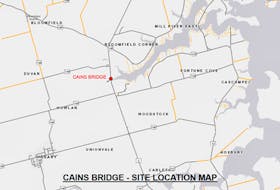CHARLOTTETOWN, P.E.I. — Stu Neatby
THE GUARDIAN
Canada’s immigration minister believes a newly re-opened immigration services office in Charlottetown will help newcomers avoid costly off-island travel and may help the province retain more skilled workers.
Immigration, Refugees and Citizenship Canada Minister Ahmed Hussen attended a brief opening ceremony, greeting the office’s three new staff members. The office, located on the fifth floor of BDC place on Kent Street, will provide permanent residency landing services, citizenship testing, immigration interviews and distribution of permanent residency cards. Fingerprints and photos for visas, permits and permanent residency cards can also be obtained through the office.
The office was closed in 2012 under the direction of then-Conservative Immigration Minister Jason Kenney. Since that time, new immigrants have often had to travel to immigration offices in Halifax to access these services.
Hussen, who also attended a citizenship ceremony for 30 new citizens at the HMCS Queen Charlotte on Thursday morning, said increasing immigration to P.E.I. has been a key driver of the Island’s growing economy.
“We need newcomers to fill much-needed unfilled jobs. We need newcomers to replace aging workers. We need newcomers to fuel our economic growth now and into the future," Hussen said in a speech at BDC Place.
However, P.E.I. has been unable to retain most immigrants who land on the Island. A study completed by the Atlantic Provinces Economic Council found that, as of 2016, P.E.I. had the weakest track record in terms of immigrant retention of any Canadian province. The Island retained only 16 per cent of immigrants, five years after they landed.
But Hussen said the Atlantic Immigration Pilot Program could turn around the province’s retention woes. The program, launched in 2017, helps match immigrants and graduated international students with employers who are having difficulty finding trained workers locally.
“Prior to the introduction of the AIPP, retention rates in Atlantic Canada were much lower than the rest of the country. Now they (have) caught up and, in some cases, surpassed retention rates in the rest of the country," Hussen said.
In an interview, Hussen said the immigrant retention rates of New Brunswick and Nova Scotia have improved but did not specifically clarify P.E.I’s current rates.
The P.E.I. immigration services office will help coordinate applicants and employers with the new program. The province has a target of matching 245 applicants to the program, more than double P.E.I.’s original allocation in 2017.
The office will not offer settlement services to graduating international students, or to temporary foreign workers. Some of these services are offered through the P.E.I. Association for Newcomers.
The Trudeau government has encouraged graduating international students to become immigrants. In 2016, the federal express entry program was altered to grant a higher points score to immigrants who have studied in Canada.
But recent immigration numbers show that, between 2017 and 2018, 25 per cent fewer graduated international students became permanent residents through express entry.
Hussen said he was unsure why the numbers for international graduates have dropped so dramatically.
"There could be a number of factors behind that, I'm not really sure. What I do know is that it remains the key program for Canada to attract the best and the brightest from around the world," Hussen said.
[email protected]
Twitter.com/stu_neatby
By the numbers
- Over the last three years, P.E.I. has seen the number of new immigrants almost double. As well, nearly 400 residents have become new citizens in the last two years
- In the Atlantic provinces, IRCC also has offices in Halifax, Fredericton, and St. John’s
- Canada is now made up of people from more than 200 ethnic groups, with 13 of these groups having Canadian populations of more than one million
- Over the last 10 years, nearly 1.7 million people have become Canadian citizens









